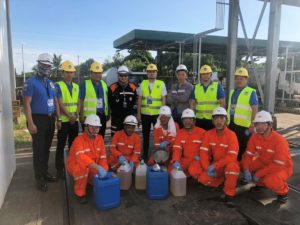 The Bureau of Customs (BOC) led the initial marking of fuel at UniOil Terminal Depot in Mariveles, Bataan, the second facility to go through the government’s fuel marking program.
The Bureau of Customs (BOC) led the initial marking of fuel at UniOil Terminal Depot in Mariveles, Bataan, the second facility to go through the government’s fuel marking program.
Some 53 million liters of fuel with paid duties and taxes amounting to P405.367 million were dosed with the official fuel marker by the fuel marking team led by BOC Port of Limay, together with representatives from fuel marking provider SGS-SICPA as well as Oilink International Corp.
The marker was poured into the storage tanks to blend with the petroleum products discharged from the carrying vessel, BOC said in a statement.
Other terminals that are also ready for the marking of their incoming fuel imports include Pure Petroleum in Subic, Phoenix Petroleum in Calaca, SL Gas, Petron Limay, Filoil Bataan, and Amlan Terminals.
READ: More oil terminals to conduct fuel marking this month
Last August, Seaoil Bulk Terminal in Mabini, Batangas was the first to undergo live fuel marking with a total of 71.379 million liters of fuel marked.
The Department of Finance, BOC, Bureau of Internal Revenue (BIR), SGS-SICPA, and the fuel companies are working hand-in-hand to fast-track the marking of all petroleum products before these are distributed in the market, the customs bureau said.
Six months after the initial marking, all petroleum products found in the domestic market including those stored in storage tanks, depots and terminal facilities will be tested for compliance with the fuel marking program.
BOC said this means that by February 3, 2020, all gasoline, diesel and kerosene products are expected to be marked completely.
Simultaneously, BOC and BIR personnel will start field testing and begin to impose penalties, if necessary, for oil companies proven to have unmarked, adulterated and/or diluted fuel.
Marking of fuel products, whether imported or manufactured in the Philippines, becomes mandatory five years after the Tax Reform for Acceleration and Inclusion (TRAIN) law took effect January 2018.
Formally launched last February, the fuel marking program also includes random field testing and confirmatory tests to check for compliance of the fuel required to be marked.
Joint Circular (JC) No. 01-2019, signed last July, executes the mandatory marking—after the taxes and duties have been paid—of refined, manufactured, or imported gasoline, diesel and kerosene in the Philippines, including those withdrawn from Free Zones to be introduced into the country.
DOF expects to collect an additional P20 billion in revenues with the full implementation of the fuel marking system next year.
The Petroleum Institute of the Philippines, which supports the program, earlier said that prior to the passage of the TRAIN Act, around P40 billion in government revenue was being lost to petroleum smuggling, a figure it said was validated by various independent studies.
